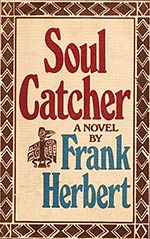
![]() Bormgans
Bormgans
1/29/2018
![]()
A few years ago, I decided to read the most important other Herbert novels before starting a reread of the Dune series. A review of Children Of Dune on the always thoughtful Gaping Blackbird, made me eager to start that reread. That review focuses on the Nietzschean inspiration of CoD, and it led to an interesting discussion in the comments. So, I was eager to dive into Dune again, but as I still had Soul Catcher on my TBR, I started that.
Yesterday, after finishing Soul Catcher, I decided to kick the reread of Dune even a bit further back, and I ordered Destination: Void, on account of Joachim Boaz, who praised Herbert's handling of its characters' psyches in the comments of my Whipping Star review - as Soul Catcher is first and foremost a character driven novel, and one that even succeeds at that. I have to admit I had given up on Herbert as non-Dune writer, as Whipping Star, The Dosadi Experiment and The Santaroga Barrier all disappointed. So I'm all the more pleased to report Soul Catcher was a good read, and one that invigorated me to give Destination: Void an honest chance.
Genre classifications being what they are, potential readers should be aware that Soul Catcher is not speculative fiction. Rob Weber reported in his review on Val's Random Comments that the publisher, Putnam, even put the following on the back flap: "This is Frank Herbert's first major novel. He has written numerous science fiction books, of which Dune...". Novels were not the same as science fiction books in 1972. Interestingly enough, there is no trace of that attitude on my 1979 edition, on the contrary. As you can see on the 1979 cover I included here, both the illustration and the text try to tap on to a speculative vibe: this is a "terrifying novel of the Spirit World". Apparently Soul Catcher didn't really catch on as regular literary fiction, and 7 years later, marketing decided to firmly latch it to Herbert's other output - it's pretty clear if you compare the vibe of the covers of the first two editions to the later one. The 2012 cover reverts the approach again. As always, ISFDB has a good overview of all the different cover art.
As Rob also wrote, the fact that this isn't a SF book should not deter Herbert fans: "the ecological and mythological themes in the book especially, ties it to a lot of Herbert's other works."
Soul Catcher deals with a Native American kidnapping a 13-year old boy with the intent to kill him, as symbolical revenge for the rape of his own sister by a gang of white men, and her ensuing suicide - and by extension all the other crimes against the indigenous humans of the continent. As such it is a book that simply would not be published in these times of hired sensitivity readers. It would not get published just because of sensitivity issues: on top of that a white man writing a story like this without a doubt would get accused of cultural appropriation too. The fact that Herbert researched the subject extensively and clearly does not sympathize with white, Western genocidary imperialism would not excuse him. I'm sure today no publisher would dare to take a chance in our era of hair trigger culture wars.
After the jump you'll find a rather lengthy discussion of a few different things: Soul Catcher as a psychological novel that also teaches us about today's 'terrorist' violence; Soul Catcher as a critique on Western society and its interesting, realistic use of the 'noble savage' trope; a discussion on the use of 'soul' vs. 'spirit'; a nugget for Dune fans, and my thoughts on the powerful ending and that ending's relation to a movie adaptition that might or might not be made.
Certain sections are quote heavy, but obviously you can skim those if the particular topic doesn't interest you that much.
(...)
Read the full review on Weighing A Pig...
https://schicksalgemeinschaft.wordpress.com/2018/01/29/soul-catcher-frank-herbert-1972/